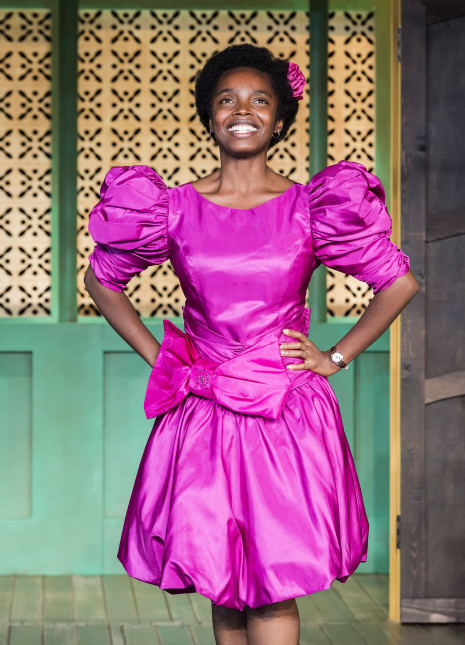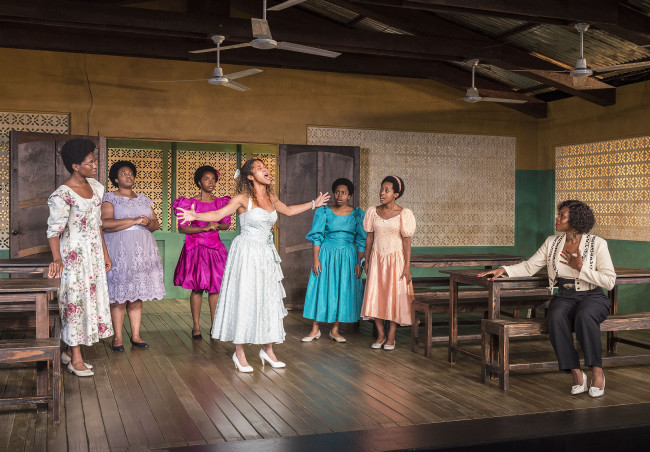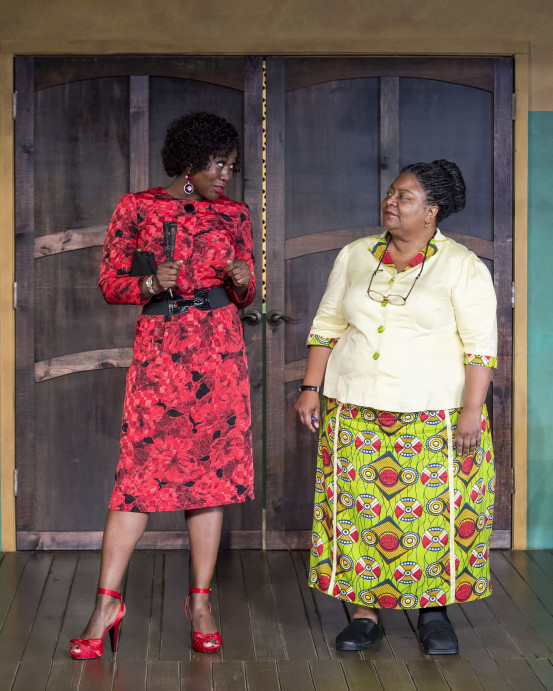The Class of ‘School Girls’ Dishes
A Q&A with New and Original Cast Members of the Off-Broadway Hit

When the cast members of School Girls; Or, the African Mean Girls Play—onstage at the Kirk Douglas Theatre September 2–30, 2018—are in the same room, it feels a lot like being in a real class.
We are rediscovering what being in a group of girls is like,
said MaameYaa Boafo, who plays clique leader Paulina, a role she also originated Off-Broadway at MCC Theater. The group stepped away from rehearsals for a bit to discuss collaboration, girlhood, and what they’ve learned from being part of this production.
MaameYaa Boafo, Paulina
I got to dig deep and find out more about what my country was like in the ’80s.
- How did you prepare for your role?
- I think [playwright] Jocelyn [Bioh] wrote the character of Paulina in a way that was very specific for me. I have been the person who has received Paulina’s treatment in the past. Although she is especially harsh, I have met people like Paulina in the different schools that I’ve been to. I tried to really remember these kinds of people and try to understand where they’re coming from. I also had friends who went to boarding school in Ghana, and I listened to stories from them and my family [from Ghana]. The play is about all the things I’ve gone through and what I’ve experienced being a non-American who grew up outside of America.
- What has it been like working with your fellow castmates?
- It’s been amazing! We all recognize that School Girls is bigger than us. There’s humor in it, but there’s also things that will grab your attention, and it’s thought-provoking. We don’t take that for granted at all. We’re all just really honored to be a part of this production, so whatever any of us can do for each other, we do it.
- What do you hope Los Angeles audiences will take away from School Girls?
- I hope audiences will experience this story for themselves. I think colorism is one of the biggest motifs in the play, but I think there are other things that you can take away from it. I hope people in Los Angeles will have a great time and that they get to continue this thought-provoking conversation.

Abena Mensah-Bonsu, Nana
Representation—that’s what this production means to me.
- How have rehearsals been for you?
- Mensah-Bonsu: They have been wonderful—very exciting. We have three new cast members. Since I was in the production last year, I’m already familiar with the show we’re doing, but it feels like a completely new show for me. I’m rediscovering moments I never had before in rehearsals, and it’s very refreshing.
- Is there something you’ve learned about yourself by being part of this production?
- Because of the bullying that my character deals with, I am more aware of how teenagers and people are affected in general. For me, it’s about placing more sensitivity into the role. I’ve learned that I’m braver than what I thought I was. I remember one time, after a talk back [at MCC Theater], somebody asked,
How do you protect yourselves as the actors [receiving the bullying]?
I realized at the time that self-care is really important, as well as absolutely knowing who you are. Maybe a year ago, I knew who I was, but now I really have to be grounded in who I am—as compared to my character—so that we can tell the story and have it not affect me so easily after we leave the stage. - What has been the most rewarding aspect for you?
- I am so thankful every day that I get to be on a team of such wonderful, smart, powerful, beautiful women and that I get to really tell this story about a big part of my heritage. Even though I’m only half Ghanaian, I never thought I’d be able to use the accent that I imitated my dad with for all these years. I never thought I would get to do it professionally.
Paige Gilbert, Gifty
I was just extremely excited to have auditioned with material that I felt extremely passionate about and really saw myself in.
- What was the collaborative process like with the cast and creative team?
- Gilbert: From day one, we were all honored by the fact that the production team was predominately women. We really stood in that, and we’re really proud of that. Building off that, we would share personal stories in rehearsals a lot of the times. I think that was something [director] Rebecca [Taichman] really opened up the room for—to feel comfortable to speak about our personal stories and what’s going on in the world that affected us. Working with Jocelyn in the room was also phenomenal, because she’s a writer and an actress. She was so giving in terms of finding certain words and sounds in the text. If she heard something in the room that she liked, she would go home and do a re-write to accommodate what our natural instincts were. I feel like we all had an equal say in creating this production.
- Do you feel like you identify the most with Gifty or do you relate more to other characters in the play?
- I feel like I’m learning more aspects of myself that I find in Gifty now. In my head, of course I’m not a follower, but I think that what causes someone to become a follower is a lack of self-confidence and the fact that Gifty feels like she relies on other people to help her. Now, I can say I do have those aspects in myself, but I also feel like I identify with Nana’s character. When I was in middle school, there were comments thrown at me about my looks, and I still carry them with me to this day.
- What is the more challenging aspect for you: researching the play or developing your character?
- I think the research aspect is pretty easy. You can go on a binge on beauty pageants alone. There’s so much information out there. As far as what’s on the page—it’s so beautifully written and a lot of answers are already embedded in the text, but there’s also such a rich backstory that fuels each scene. So I feel like creating is what I find a little bit more challenging.

Joanna A. Jones, Ericka
I think the camaraderie between us all is the most rewarding—it creates a safe haven of support and togetherness.
- How have you prepared for the role of Ericka?
- Jones: There are a few themes in Ericka’s life that I find I can relate to quite personally—like being
the new girl,
the complex experience of being a biracial kid, and a deep and close attachment to my mother. I’m using these similarities from my own life experience to explore Ericka’s journey and struggle. - Did you draw inspiration from your own high school experience?
- Absolutely. As I mentioned, I’ve been the
new girl
before, more times than I’d like to count. I remember vividly what it feels like to try and fit myself in to an already established group. As we all know, high school kids can be brutal, and at that age, we don’t fully know ourselves yet. We are still developing. There is a vulnerability there that creates such high stakes. - What has the collaborative process been like with the cast and crew?
- The original cast and crew have been very welcoming to us newcomers! The collaborative process has been a nice balance of respecting the incredible work done in the first production and being open to finding new things this time around. Rebecca, Jocelyn, and the cast have made it a very safe and enjoyable environment for creative and artistic exploration.
Myra Lucretia Taylor, Headmistress Francis
I just try to do the best I can when I’m presented with challenges.
- How did you first encounter Jocelyn’s work?
- Taylor: My first encounter with Jocelyn’s work was with her as an actor. I saw her in Men On Boats Off-Broadway, and she was so good! It was one of those,
Who is that?!
moments. - What has the collaborative process been like for you?
- We like and respect each other so much. We’re each other’s biggest cheerleaders. Because Jocelyn’s such a good playwright, the preparation for my role was and is to read the script.
- What has been the most rewarding aspect of being part of this production?
- When audiences say they’re coming back and bringing their family and friends.

Mirirai Sithole, Mercy
There are mean girls and guys everywhere.
- Did you draw inspiration from your own high school experience?
- Sithole: I didn’t really draw from my high school experience. While we were first doing tablework, stories started coming out. We talked about times when we were bullied or if we were the bully; we really got down to the dynamics of women. I am fortunate enough to have great relationships with women. I came here from Zimbabwe and tried to fit in, or there would be instances where I didn’t fit in. So, for me, in order to understand my role, I tried to think about how someone can be so mean and cruel just to stay in Paulina’s group. I just had this general understanding of the dynamics of growing up and being different and trying to fit in.
- What has been the biggest challenge for you in your role?
- We’re always trying not to laugh because the play is so funny. The challenge is to not let what we did before at MCC overshadow what we’re doing now. I want to just allow whatever happened in the past to feed and guide me, as opposed to letting it be something that boxes me in.
- What has been the most rewarding aspect?
- I’ve never done a comedy before this! That’s so rewarding for me—to express fun and deep and important issues. To open people up and let them laugh and think about why they’re laughing. I feel privileged to be able to tell this story at this time with my own body and my natural hair. To have myself and my castmates be seen as natural, regardless of our backgrounds.
Latoya Edwards, Ama
Everyone attached to this project has worked extremely hard to bring a piece of work—written by a Ghanaian playwright and performed by a cast of all women of color—to a new audience.
- How did you first encounter Jocelyn’s work?
- Edwards: My first introduction to Jocelyn’s work was seeing School Girls last year. I had a friend in it, Mirirai, and I had heard amazing things about the show, so a few girlfriends of mine and I went out to see it together.
- How did you prepare for your role?
- When we first meet Ama, she is dealing with a major turning point/decision in her life. She’s been best friends with Paulina for quite some time and is navigating whether or not this is a healthy friendship to still be in. So, for me, I had to find the love [in this situation]—whether this was the beginning or ending in Ama’s relationship with these girls and especially with Paulina.
- What has been the biggest challenge for you?
- I think it’s hard stepping into a role where most of the cast members have spent time building a relationship and character history with the previous actors. The challenge for me was respecting what was done before but also trusting myself to make Ama my own.
Zenzi Williams, Eloise Amponsah
In preparation for this role, I have focused on Eloise’s wants and needs.
- What has the collaborative process been like with the cast, Rebecca, and Jocelyn?
- Williams: I joined the cast very recently, and it has felt like I’ve been a part of the School Girls family from the very beginning. Rebecca has provided me with space to create and learn new things about this story and this character. Jocelyn has been so open-hearted and informative about how she has created this story. I truly wake up excited to go to work in the morning.
- Have you discovered something within yourself?
- I’ve discovered that I have lots of memories of defining beauty as something that is outside of myself, that I needed to achieve. Although it’s been difficult, I have broken down many of those definitions and fully embraced my beauty.
- What has been the most rewarding aspect of being in this production for you?
- The most rewarding thing has really been working with a group of people that are so supportive and encouraging, as well as being part of a story that resonates with me and my childhood.